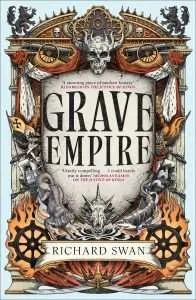INTERVIEW: Richard Swan
Last Updated on January 26, 2025
Richard Swan is the Sunday Times best-selling author of the Empire of the Wolf dark fantasy trilogy (The Justice of Kings, The Tyranny of Faith, and The Trials of Empire) and The Art of War space opera trilogy (Reclamation, The Ascendancy War, and Empire of the Fallen). He’s one of our favourite authors, creating dark worlds and incredible stories at a rather prolific rate, with characters and themes that grimdark fans love.
 With the first book in his next trilogy, Grave Empire, set for release from Orbit next month, we sat down with Swan to better understand what has made him the author he is today.
With the first book in his next trilogy, Grave Empire, set for release from Orbit next month, we sat down with Swan to better understand what has made him the author he is today.
[GdM] What novel helped you become who you are? And how?
[RS] The Ring of Five Dragons by Eric van Lustbader. It was the first proper adult fantasy I read. I came across it in our local bookshop when I was about 12 or so, a hefty tome six or seven hundred pages long. I think I understood about half of what was going on, but it was an electrifying experience. It was my first introduction to proper adult secondary world fantasy and a turning point / sliding doors moment in my life. A lot of my subsequent writing, and eventual writing career, can be traced back to that nexus.
[GdM] Do you recall anything in particular around how the introduction to that first proper adult secondary world fantasy created that sliding doors moment to change the course of who you would become as an author and a person? And what did that book lead you to read in the following years?
[RS] It was the marriage of science fiction and fantasy. From memory it’s about a secondary fantasy world that’s invaded by an interstellar empire, and the invaded are waiting for the return of their messiah. There’s a lot of different genre elements in play, including religion / mysticism; I’d read fantasy before then (Narnia, The Hobbit, other kids-oriented fantasy like Redwall) but the breadth of this world—to say nothing of the adult themes (violence, sex, profanity, etc), rewired my brain. After this it was straight on to Peter F. Hamilton’s the Night’s Dawn trilogy, which would probably lay the blueprint for how I approached writing forever—not just space opera, but the actual fundamentals of planning and writing a novel. For the rest of my teenage years it really was as much sci fi as I could get my hands on—Iain M Banks, more Hamilton, Dan Abnett, tons from the SF Masterworks series, tons of ALIENS expanded universe books and comics—the list is endless.
[GdM] Beyond the SF Masterworks collection, Both Banks and Hamiliton are now universally known as being some of the greatest and most influential writers that SFF has ever had. You mentioned Night’s Dawn, and the Culture series—what is it about the books that taught you how to approach writing?
[RS] For both of them it was all about structure. For PFH it was that classic multi-POV (sometimes multi-multi POV) epic space opera which I used to try and copy entirely when planning and writing my own sci fi in my teens. Something I’ve also always loved about Hamilton’s writing is that he never loses that dramatic human side to his writing; there’s as much almost telenovela drama in the Night’s Dawn Trilogy—lovers clashing, salacious goings-on, etc—as there is epic space combat and high tech, highly kinetic space warfare. For Banks it was both thematic and structural. I took a lot of cues from the GWOT paranoia that was so evident in Banks’ later Culture novels—good guys secretly doing bad things—but also the way he played with structure. Books like Walking on Glass, The Bridge, and Use of Weapons were absolutely crucial in showing me what it was possible to do with novel structure; things like parallel, inverted chronologies, ends that are beginnings that recontextualise everything you’ve read before, books that are essentially puzzles to be solved. The man really was a genius.
This interview with Richard Swan was first published in Grimdark Magazine Issue #41
Read Grave Empire by Richard Swan
The post INTERVIEW: Richard Swan appeared first on Grimdark Magazine.



